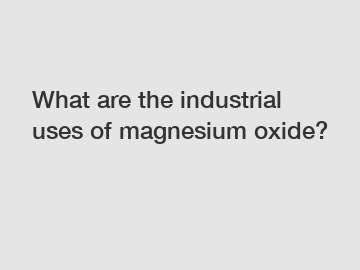Feb. 20, 2024
Chemicals
Magnesium oxide, also known as magnesia, is a versatile and widely-used industrial chemical with a multitude of applications across various industries. This white, powdery substance is derived from the calcination of magnesium carbonate or magnesium hydroxide and boasts several unique properties that make it essential in industrial processes. In this blog post, we will explore the numerous industrial uses of magnesium oxide and how it plays a crucial role in enhancing efficiency and productivity in different sectors.
1. Refractories:
One of the primary industrial uses of magnesium oxide is in the production of refractory materials. Magnesia is known for its high melting point, excellent thermal conductivity, and resistance to corrosion, making it an ideal material for lining furnaces, kilns, and other high-temperature equipment. Refractories made from magnesium oxide can withstand extreme heat and chemical reactions, making them essential in industries such as steelmaking, cement production, and glass manufacturing.

2. Agriculture:
Magnesium oxide is a key component in agricultural fertilizers and soil amendments. It provides essential nutrients to plants, promotes healthy growth, and improves soil quality. Magnesium-deficient soil can lead to poor crop yields and nutrient deficiencies in plants. By adding magnesium oxide to the soil, farmers can enhance the fertility of the land and increase crop production. Additionally, magnesium oxide is used in animal feed supplements to ensure proper nutrition and health for livestock.
3. Pharmaceuticals:
Magnesium oxide is commonly used in the pharmaceutical industry as an active ingredient in antacids and laxatives. It acts as a neutralizing agent to relieve symptoms of heartburn, indigestion, and acid reflux by balancing the pH levels in the stomach. Magnesium oxide also has laxative properties that help alleviate constipation and promote bowel movements. Its safety, effectiveness, and low cost make it a popular choice in over-the-counter medications for gastrointestinal disorders.
4. Construction:
In the construction industry, magnesium oxide is used in the production of lightweight and fire-resistant building materials. Magnesia boards, panels, and insulation products offer superior strength, durability, and thermal insulation properties. They are also moisture-resistant and non-toxic, making them environmentally friendly and sustainable building materials. Magnesium oxide-based products are ideal for residential and commercial construction projects, providing structural integrity and fire protection.
5. Water treatment:
Magnesium oxide is a vital component in water treatment processes to remove impurities and improve water quality. It helps neutralize acidic water, reduce harmful contaminants, and control the pH levels in wastewater treatment facilities. Magnesia-based chemicals are used in coagulation, flocculation, and disinfection processes to purify drinking water, industrial wastewater, and municipal sewage. The high reactivity and adsorption capacity of magnesium oxide make it an effective treatment solution for water purification systems.
6. Metallurgy:
Magnesium oxide plays a crucial role in metallurgical applications, particularly in the production of metals such as steel, aluminum, and titanium. It serves as a fluxing agent in smelting processes to remove impurities, improve metal quality, and enhance melting efficiency. Magnesia also acts as a refractory lining in crucibles, ladles, and molds to withstand high temperatures and chemical reactions during metal casting and alloying. Its refractory properties make it an indispensable material in the foundry and metalworking industries.
7. Energy storage:
Magnesium oxide is utilized in the manufacturing of rechargeable batteries, including lithium-ion batteries and fuel cells. It serves as a cathode material that provides high energy density, stability, and long-lasting performance in electronic devices, hybrid vehicles, and renewable energy systems. Magnesia-based batteries offer improved efficiency, faster charging times, and reduced environmental impact compared to traditional energy storage technologies. The growing demand for sustainable energy solutions has driven the development of magnesium oxide-based batteries as a reliable and eco-friendly power source.
In conclusion, magnesium oxide is a versatile industrial chemical with a wide range of applications across various sectors. Its unique properties, such as high temperature resistance, chemical stability, and reactivity, make it an essential component in manufacturing processes, construction projects, and environmental applications. As industries continue to innovate and evolve, the demand for magnesium oxide is expected to increase, driving further advancements in technology, sustainability, and efficiency. Whether it's in refractories, agriculture, pharmaceuticals, construction, water treatment, metallurgy, or energy storage, magnesium oxide plays a crucial role in promoting growth, productivity, and progress in the industrial landscape.
Contact us to discuss your requirements of CAS 2079878-75-2 2F, Local Anesthetic Drugs(Caine) for Sale, CAS 2079878-75-2 2F. Our experienced sales team can help you identify the options that best suit your needs.
Previous: What is the price of HPMC?
If you are interested in sending in a Guest Blogger Submission,welcome to write for us!
All Comments ( 0 )